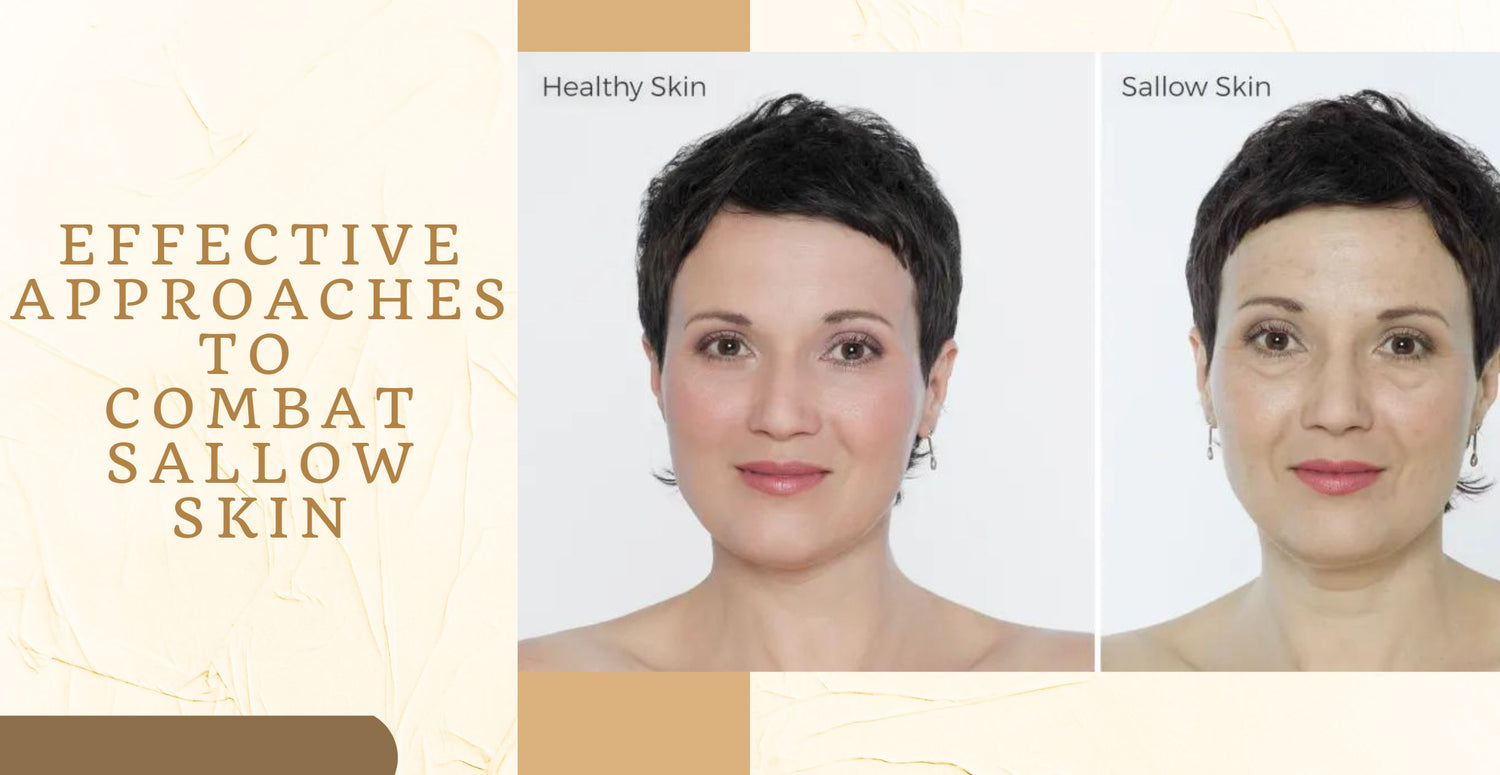Combating sallow skin entails addressing the root causes and implementing effective skincare and lifestyle strategies to restore radiance and vitality to the complexion. In this blog, we will look at some strategies for improving sallow skin.
Unraveling the Mystery of Sallow Skin: Causes and Characteristics
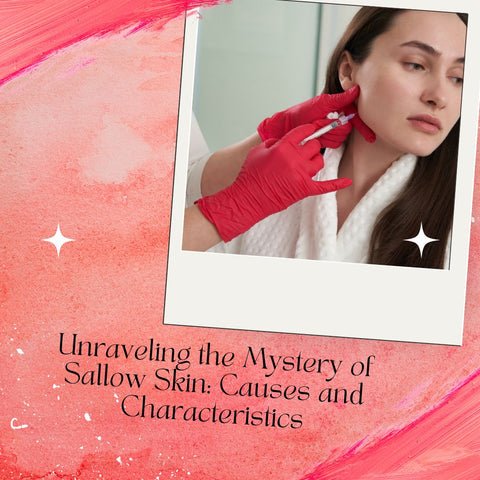
Sallow skin is defined as a complexion that appears dull, yellowish, or lacklustre, indicating a loss of radiance and vitality. Understanding the causes and characteristics of sallow skin can aid in managing and improving its appearance. Here's the breakdown:
-
Causes of sallow skin include poor circulation, dehydration, sun damage, a poor diet, stress, and environmental pollution.
-
Sallow skin characteristics include dullness, uneven tone, loss of firmness, dryness, and fatigue.
Identifying the Signs of Sallow Skin
Recognising certain characteristics and changes in complexion that indicate a lack of radiance and vitality is necessary to detect sallow skin. Here are some common signs to watch out for:
-
Dullness: Sallow skin is often dull and lacklustre, lacking the healthy glow that comes with well-hydrated, vibrant skin. The complexion may appear flat or lifeless, with a distinct lack of brightness.
-
Yellowish or Greyish Undertone: Sallow skin can have a yellowish or greyish undertone, giving it a dull, muted appearance. This discoloration may be more visible in specific areas of the face, such as the cheeks, forehead, or chin.
-
Uneven Skin Tone: Sallow skin may have uneven skin tone, including discoloration, dark spots, or hyperpigmentation. These patches can exacerbate the overall dullness and lack of vitality in the complexion.
-
Dryness or Rough Texture: Sallow skin can feel dry, rough, or coarse to the touch, indicating a lack of moisture and hydration. Dry patches may be more noticeable, particularly in dehydrated areas such as the cheeks or mouth.
-
Firmness Loss: Sallow skin can lose firmness and elasticity over time, resulting in sagging or drooping in specific areas of the face. This can give an overall tired or aged appearance.
-
Fatigue or Exhaustion: Sallow skin can indicate fatigue or exhaustion, especially when combined with other symptoms such as dark circles under the eyes or a tired, drawn appearance. Lack of sleep, stress, and poor lifestyle choices can all contribute to a sallow complexion.
-
Increased Visibility of Fine Lines and Wrinkles: Sallow skin can highlight the appearance of fine lines and wrinkles. Several factors contribute to this, including collagen and elastin loss, dehydration, and decreased skin vitality.
You can improve the general health and appearance of your complexion by addressing the underlying causes of sallow skin by being aware of these symptoms. Restoring radiance and vitality to sallow skin can be accomplished by following a thorough skincare regimen, managing stress, eating a balanced diet, and staying hydrated.
Common Causes Behind Skin's Loss of Luster
Several internal and external factors can be responsible for the skin's loss of lustre. The following are some typical reasons why skin becomes less radiant:
-
Lack of hydration can lead to dull, lackluster skin. Dehydrated skin has a rough, dry, and less radiant appearance. Inadequate water intake, environmental conditions, and harsh skincare products can all contribute to dehydration.
-
As we age, the skin's natural renewal process slows, causing a buildup of dead skin cells on the surface. This can leave the skin looking dull and uneven in texture. Furthermore, as we age, our collagen and elastin production decreases, resulting in a loss of firmness and elasticity, which contributes to a dull appearance.
-
Overexposure to UV radiation from the sun can harm the skin's cells and collagen fibres, causing premature ageing and a dull appearance. Sun damage can also result in hyperpigmentation, uneven skin tone, and the formation of fine lines and wrinkles, all of which can reduce the skin's radiance.
-
A diet low in essential nutrients, antioxidants, and hydration can harm skin health and contribute to a lack of lustre. Excessive consumption of processed foods, sugar, and alcohol can exacerbate inflammation and oxidative stress, dulling the complexion even more.
-
Inadequate sleep can disrupt the skin's natural repair and renewal processes, resulting in a tired and dull appearance. The body produces collagen and repairs damage caused by environmental stressors while sleeping, so getting enough rest is critical for maintaining a healthy, radiant complexion.
-
Chronic stress can cause inflammation in the body and disrupt hormone levels, resulting in skin conditions like acne, eczema, and dullness. Stress can also impair the skin's barrier function, leaving it more vulnerable to environmental aggressors and contributing to a dull appearance.
-
Exposure to environmental pollutants, cigarette smoke, and other toxins can harm skin cells and hasten the ageing process, resulting in a dull, lacklustre complexion. Indoor heating and air conditioning can also remove moisture from the skin, leaving it looking dry and dull.
By addressing these common causes of skin lustre loss with proper hydration, sun protection, a balanced diet, adequate sleep, stress management, and skincare interventions, you can help restore radiance and vitality to your complexion.
The Role of Lifestyle and Environmental Factors
Lifestyle and environmental factors have a significant impact on the health and appearance of the skin, including lustre and radiance. Here's how these factors affect the skin:
-
Diet: A well-balanced diet high in fruits, vegetables, lean proteins, and healthy fats contains essential nutrients and antioxidants that promote skin health. In contrast, a diet high in processed foods, sugars, and unhealthy fats can cause inflammation, oxidative stress, and skin problems such as dullness.
-
Hydration: Staying hydrated is essential for keeping your skin healthy and radiant. Drinking plenty of water throughout the day keeps the skin hydrated from within, improving its overall appearance and preventing dullness and dehydration.
-
Sleep: Proper sleep is necessary for skin regeneration and repair. During sleep, the body produces collagen and growth hormones, which aid in the repair of environmental stressors and promote healthy, radiant skin. Lack of sleep can result in a tired, dull complexion.
-
Stress: Chronic stress can harm skin health by causing inflammation, disrupting hormone levels, and impairing barrier function. This can cause a variety of skin issues, including dullness, acne, and premature ageing.
-
Sun Exposure: Prolonged exposure to UV radiation from the sun can harm the skin's cells and collagen fibres, resulting in sunburn, premature ageing, and a dull, uneven complexion. Sunscreen, protective clothing, and seeking shade can all help prevent sun damage and keep your skin radiant.
-
Pollution: Exposure to environmental pollutants such as air pollution, cigarette smoke, and heavy metals can impair the skin's barrier function and hasten ageing. Pollution can also cause inflammation, oxidative stress, and skin issues like dullness and uneven tone.
-
Indoor Environment: Heating and air conditioning can remove moisture from the air and skin, resulting in dehydration and dullness. Using a humidifier, avoiding long, hot showers, and moisturising regularly can help keep skin hydrated and radiant.
-
Skincare Routine: Consistent skincare practices, such as cleansing, moisturising, exfoliating, and protecting the skin from environmental aggressors, are critical for maintaining skin health and radiance. Using products designed for your skin type and concerns can help address specific issues and improve skin luminosity.
By addressing lifestyle and environmental factors that affect skin health, as well as adopting healthy habits, you can promote a radiant, glowing complexion and keep skin lustre for longer.
Transforming Tired Skin: Proven Strategies for Revival
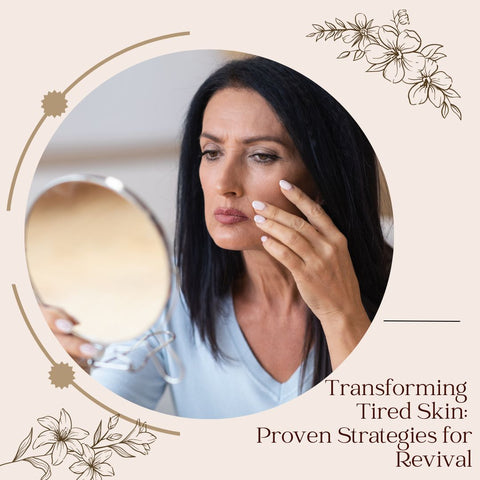
To transform tired skin, a multifaceted approach is required that addresses both internal and exterior issues. Hydration, a healthy diet, quality sleep, stress management, regular exercise, a skincare routine, exfoliation, sun protection, and professional treatments are all effective ways to revitalise weary skin. By adopting these tried-and-true tactics into your skincare routine and lifestyle, you may effectively rejuvenate weary skin and attain a more vibrant, glowing complexion. Consistency and patience are essential, as gains in skin health and appearance may take time to show.
The Power of Hydration and Nourishment
Hydration and nourishment are essential for having healthy, vibrant skin. Here's why they are effective tools for revitalising tired skin.
Hydration:
-
Proper hydration helps maintain the skin's moisture balance, preventing it from becoming dry, dull, and dehydrated. Skin that is properly hydrated appears plump, smooth, and radiant.
-
Hydration helps the skin's barrier function, which serves as a shield against environmental stressors, pollutants, and irritants. A strong skin barrier retains moisture and nutrients while keeping harmful substances out.
-
Adequate hydration increases skin elasticity, making it more resilient and resistant to fine lines, wrinkles, and sagging. Hydrated skin has a natural bounce and suppleness, which contributes to a youthful appearance.
-
Dehydrated skin is prone to irritation, redness, and sensitivity. By keeping the skin hydrated, you can reduce these issues and achieve a more comfortable, calm complexion.
Nourishment:
-
Nourishing the skin with vitamins, minerals, antioxidants, and fatty acids supports its overall health and function. These nutrients help repair damage, protect against environmental aggressors, and promote cell turnover for a brighter, more youthful complexion.
-
Well-nourished skin has a smoother, more even texture. Essential fatty acids, such as omega-3 and omega-6, contribute to the skin's lipid barrier, preventing moisture loss and increasing softness and suppleness.
-
Certain nutrients, such as vitamin C, vitamin E, and peptides, can promote collagen synthesis in the skin. Collagen is necessary for maintaining skin firmness and elasticity, which helps to reduce the appearance of fine lines and wrinkles.
-
Antioxidants help to neutralise free radicals caused by UV radiation, pollution, and other environmental stressors. By protecting the skin from oxidative damage, antioxidants help prevent premature aging and maintain a youthful glow.
Key Vitamins and Antioxidants for Skin Rejuvenation
Several vitamins and antioxidants aid in skin rejuvenation by increasing collagen production, protecting against oxidative damage, and improving overall skin health. Here are some essentials to incorporate into your skincare routine:
-
Vitamin C (Ascorbic Acid): Increases collagen synthesis, which improves skin firmness and elasticity. It lightens the complexion and evens out the skin tone by reducing hyperpigmentation and dark spots. Provides antioxidant protection against free radical damage caused by UV radiation and environmental pollutants.
-
Vitamin E (Tocopherol): An effective antioxidant that protects the skin from oxidative stress and premature ageing. Helps to maintain the skin's lipid barrier, preventing moisture loss and increasing hydration. Promotes skin repair and regeneration, minimising the appearance of scars and fine lines.
-
Vitamin A (retinol, retinoids): Promotes collagen production, improves skin texture, and reduces the appearance of wrinkles. It increases cell turnover, which promotes the removal of dead skin cells and reveals fresh, youthful skin. Helps fade hyperpigmentation, acne scars, and other signs of sun damage.
-
Vitamin B3 (Niacinamide): Improves moisture retention and reduces transepidermal water loss by strengthening the skin's barrier function. It reduces inflammation and redness, making it ideal for sensitive and acne-prone skin. Helps to regulate sebum production, which reduces oiliness and the appearance of pores.
-
Vitamin B5 (Panthenol): It hydrates and soothes the skin, reducing dryness, irritation, and inflammation. Supports wound healing and repair, as well as skin regeneration and recovery from damage. It enhances skin texture and elasticity, leaving it soft, smooth, and supple.
-
Coenzyme Q10 (ubiquinone): A potent antioxidant that protects the skin from oxidative stress and environmental damage. Increases collagen and elastin production, minimising the appearance of wrinkles and fine lines. Improves skin repair and regeneration, resulting in better skin health and vitality.
-
Green Tea Extract: Contains polyphenols and catechins with antioxidant and anti-inflammatory properties. Protects the skin from UV damage and photoaging, which lowers the risk of sunburn and skin cancer. Reduces redness and irritation while soothing sensitive and reactive skin.
Tailored Skincare Routines for Enhanced Radiance
Developing a tailored skincare routine aimed at increasing radiance entails incorporating products and ingredients that promote brightness, even tone, and a healthy glow. Here's a customisable skincare routine to boost radiance:
Morning Routine:
-
Begin the day with a gentle cleanser that removes impurities and excess oil without stripping the skin. To keep moisture levels stable, look for a hydrating cleanser that contains ingredients such as glycerin or hyaluronic acid.
-
Use a brightening or hydrating toner to rebalance the skin's pH and prepare it for the next step in skincare. Look for toners that contain niacinamide or vitamin C to boost radiance and even out skin tone.
-
Use a vitamin C serum to brighten your skin, fade dark spots, and protect it from free radical damage. Choose a stable vitamin C formulation with a concentration of around 10-20% for maximum effectiveness.
-
Follow up with a lightweight, hydrating moisturiser to seal in moisture and nourish the skin. Look for moisturisers with hyaluronic acid, vitamin E, or ceramides to plump up the skin and improve elasticity.
-
Finish your morning routine with a broad-spectrum sunscreen with an SPF of 30 or higher to protect your skin from UV damage and premature ageing. Select a sunscreen that provides UVA and UVB protection and is appropriate for your skin type.
Evening Routine:
-
Start your evening routine with a double cleanse to remove the day's makeup, sunscreen, and impurities. Begin with an oil-based cleanser to remove makeup, then follow with a gentle foaming or cream cleanser to thoroughly cleanse the skin.
-
Use a chemical exfoliant 2-3 times per week to remove dead skin cells and increase cell turnover. Look for exfoliants containing alpha hydroxy acids (AHAs) like glycolic acid or beta hydroxy acids (BHAs) like salicylic acid to brighten the complexion and improve skin texture.
-
Use a targeted treatment, such as a retinol serum or peptide cream, to address specific skin issues such as fine lines, wrinkles, or uneven texture. These ingredients stimulate collagen production and promote skin renewal, resulting in a more youthful appearance.
-
Use a hydrating mask once or twice a week to replenish moisture and revive dull, tired-looking skin. Choose a mask containing ingredients like hyaluronic acid, aloe vera, or honey to nourish and soothe the skin.
-
Finish your evening routine with an eye cream designed to hydrate the delicate skin around the eyes while reducing the appearance of dark circles and puffiness. Look for eye creams with caffeine, vitamin K, or peptides to brighten and firm the under-eye area.
Advanced Solutions: Dermatologist-Recommended Treatments
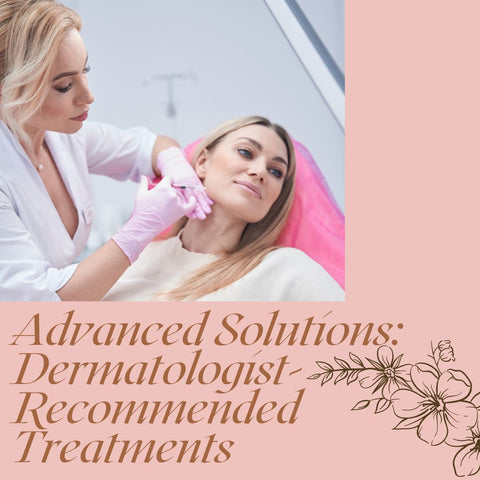
Dermatologists can suggest advanced skincare treatments to address specific skin issues and boost radiance. Below are some dermatologist-recommended treatments for achieving advanced radiance:
-
Chemical peels involve the application of a chemical solution to the skin, which exfoliates the outer layer and stimulates cell turnover. Peels can improve skin texture, tone, and clarity, resulting in a more vibrant complexion. Options include superficial peels (e.g., glycolic acid, lactic acid) for mild exfoliation and deeper peels (e.g., trichloroacetic acid, phenol) for more significant rejuvenation.
-
Microdermabrasion is a non-invasive procedure that uses a diamond-tipped wand or fine crystals to exfoliate and remove dead skin cells. This treatment can improve skin texture, reduce the appearance of fine lines and wrinkles, and increase overall radiance by stimulating cell renewal and collagen production.
-
Laser skin resurfacing treatments employ laser technology to address specific skin issues such as sun damage, pigmentation, and uneven texture. Fractional laser resurfacing increases collagen production and promotes skin renewal, resulting in smoother, more radiant skin with less downtime.
-
Microneedling, also known as collagen induction therapy, is a technique that uses fine needles to create micro-injuries in the skin, thereby stimulating collagen and elastin production. This treatment improves skin texture, tone, and firmness, resulting in a more radiant complexion over time.
-
Intense Pulsed Light (IPL) Therapy uses broad-spectrum light energy to treat pigmentation, redness, and other skin issues. This treatment, which targets specific chromophores in the skin, can help to even out skin tone, reduce hyperpigmentation, and improve overall brightness.
-
Dermal fillers and neuromodulators (e.g., Botox) are injectable treatments that can improve facial contours, smooth fine lines and wrinkles, and restore volume to the skin, giving it a more youthful, radiant appearance. These treatments are frequently used in conjunction with other procedures to provide complete rejuvenation.
-
Platelet-Rich Plasma (PRP) Therapy involves extracting platelets from the patient's blood and injecting them back into the skin to stimulate collagen production and promote tissue regeneration. This treatment improves skin texture, tone, and luminosity, resulting in a more radiant complexion over time.
Before beginning any advanced skincare treatments, consult with a board-certified dermatologist or skincare professional to evaluate your skin concerns and determine the best treatment plan for you. They can recommend personalised treatments based on your skin type, concerns, and desired results, allowing you to achieve advanced radiance and a healthier, more youthful complexion.
Professional Facial Treatments for Immediate Results
Professional facial treatments can produce immediate results by addressing various skin issues and increasing radiance. Here are some popular facial treatments with immediate benefits:
-
HydraFacial: The HydraFacial is a non-invasive facial treatment that includes cleansing, exfoliation, extraction, hydration, and antioxidant protection in one session. It effectively eliminates dead skin cells, absorbs pollutants, and hydrates the skin, leaving it smooth, invigorated, and radiant immediately.
-
Oxygen Facial: Oxygen facials involve infusing the skin with a high-pressure stream of oxygen and specialized serums containing vitamins, antioxidants, and hyaluronic acid. This treatment instantly plumps up the skin, reduces the appearance of fine lines and wrinkles, and improves overall hydration and radiance.
-
Microcurrent Facial: Microcurrent facials use low-level electrical currents to stimulate facial muscles, lift and firm sagging skin, and promote collagen production. This treatment provides immediate tightening and toning effects, resulting in a more lifted, youthful appearance and improved skin radiance.
-
LED Light Therapy: LED light therapy facials use different wavelengths of light to target specific skin concerns such as acne, inflammation, pigmentation, and aging. This treatment can improve skin tone, texture, and clarity, resulting in a brighter, more even complexion immediately after treatment.
-
Chemical Peel: Chemical peels involve applying a chemical solution to the skin to exfoliate the outer layer and stimulate cell turnover. Depending on the peel's strength and formulation, this treatment can improve skin texture, tone, and luminosity, providing immediate rejuvenation and radiance.
-
Dermaplaning: Dermaplaning is a physical exfoliation treatment that uses a sterile surgical blade to remove dead skin cells and peach fuzz from the skin's surface. This treatment instantly smooths and softens the skin, improves product penetration, and enhances makeup application for a glowing complexion.
-
Cryotherapy Facial: Cryotherapy facials involve exposing the skin to extremely cold temperatures using liquid nitrogen or cold air to stimulate circulation, reduce inflammation, and tighten the skin. This treatment instantly refreshes and revitalizes the complexion, leaving it glowing and radiant.
Incorporating Exfoliation for Brighter Skin
Exfoliation is an essential step in any skincare regimen to achieve brighter, more radiant skin. Here's how to incorporate exfoliation into your skincare routine:
-
Choose the Right Exfoliant: Exfoliants are classified into two types: chemical and physical. Chemical exfoliants use acids or enzymes to dissolve and remove dead skin cells, whereas physical exfoliants use granules or particles to manually slough them off. Choose an exfoliant appropriate for your skin type and concerns.
-
Exfoliate regularly: Depending on the sensitivity and tolerance of your skin, aim for 2-3 times per week. Exfoliating too much can deplete the skin's natural oils and cause irritation, so finding the right balance is critical.
-
Start Slowly: If you are new to exfoliation or trying a new product, begin with a lower frequency and gradually increase as your skin adjusts. This will help to reduce the risk of irritation and sensitivity.
-
Follow Instructions: To ensure safe and effective use, always follow the instructions that come with your exfoliant. Pay close attention to the recommended usage frequency, application techniques, and any cautions or warnings.
-
Patch Test: Before applying a new exfoliant to your entire face, perform a patch test on a small area of skin to check for any adverse reactions or sensitivity.
-
Adjust Based on Skin Response: Pay attention to how your skin reacts to exfoliation. If you experience redness, irritation, or discomfort, reduce the frequency of exfoliation or use a gentler exfoliant.
-
Moisturise and Protect: After exfoliating, apply a hydrating moisturiser to replenish lost moisture and nourish the skin. Do not forget to use sunscreen during the day to protect your freshly exfoliated skin from UV damage.
-
Consider Professional Treatments: In addition to at-home exfoliation, you could look into professional exfoliating treatments like chemical peels, microdermabrasion, or dermaplaning. These treatments, when performed by a skincare professional, can provide deeper exfoliation and more dramatic results.
You can efficiently remove dead skin cells, clear clogged pores, and uncover skin that is brighter and more radiant by including exfoliation in your skincare routine. Just keep in mind that for best results, gently exfoliate your skin, pay attention to what it needs, and modify your routine as needed.
Long-Term Prevention Strategies and UV Care
Long-term prevention strategies and UV care are essential for maintaining skin health, preventing premature aging, and reducing the risk of skin cancer. Here are some key strategies to incorporate into your skincare routine:
-
Apply a broad-spectrum sunscreen with an SPF of 30 or higher every day, even on cloudy or overcast days. Choose a sunscreen that offers protection against both UVA and UVB rays and reapply every two hours, especially if you're spending extended periods outdoors.
-
Whenever possible, seek shade during peak sun hours, typically between 10 a.m. and 4 p.m. This reduces your overall UV exposure and lowers the risk of sunburn and skin damage.
-
Wear protective clothing, such as wide-brimmed hats, sunglasses, and long-sleeved shirts, to shield your skin from direct sunlight. Lightweight, breathable fabrics with UPF (Ultraviolet Protection Factor) offer additional sun protection.
-
Avoid using tanning beds, as they emit harmful UV radiation that can damage the skin and increase the risk of skin cancer. Opt for sunless tanning products or bronzing lotions for a safe, sun-kissed glow.
-
Drink plenty of water to keep your skin hydrated from within. Hydrated skin is more resilient and less prone to damage from environmental stressors, including UV radiation.
-
Incorporate antioxidant-rich skincare products into your routine to help neutralize free radicals generated by UV exposure. Look for ingredients like vitamin C, vitamin E, green tea extract, and resveratrol to enhance your skin's natural defense mechanisms.
-
Perform regular skin self-exams to monitor moles, freckles, and other skin lesions for changes in size, shape, color, or texture. Consult a dermatologist promptly if you notice any suspicious or concerning changes.
-
Schedule regular skin cancer screenings with a dermatologist, especially if you have a personal or family history of skin cancer or significant sun exposure. Early detection and treatment can significantly improve outcomes for skin cancer.
-
Maintain a healthy lifestyle by eating a balanced diet, exercising regularly, managing stress, and avoiding smoking and excessive alcohol consumption. These habits support overall skin health and contribute to a radiant complexion.
Crafting Your Personalized Skincare Plan for Sallow Skin
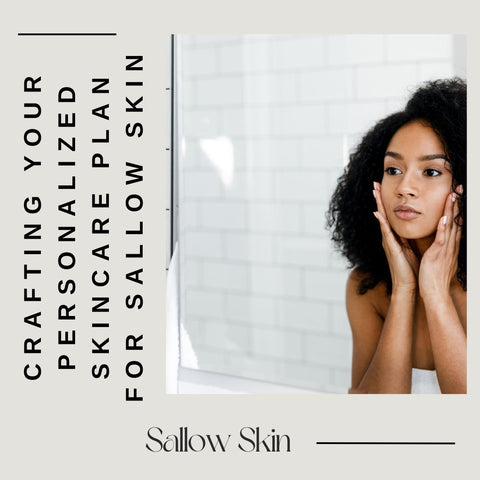
Creating a personalised skincare plan for sallow skin entails addressing specific issues like dullness, uneven tone, and lack of radiance. Here's a tailored approach to help revive sallow skin and enhance its natural glow:
-
Gentle Cleansing: Begin your skincare routine with a gentle cleanser that is appropriate for your skin type. Avoid harsh cleansers, which can deplete the skin's natural oils and contribute to dryness and dullness. To maintain moisture balance, look for cleansers that include hydrating ingredients such as glycerin or hyaluronic acid.
-
Exfoliation: Incorporate exfoliation into your daily routine to remove dead skin cells and increase cell turnover. To brighten the complexion and improve skin texture, use a chemical exfoliant that contains alpha hydroxy acids (AHAs), such as glycolic acid, or beta hydroxy acids (BHAs), such as salicylic acid.
-
Hydration: Use a lightweight, non-comedogenic moisturiser to replenish moisture and nourish your skin. Look for moisturisers that include hyaluronic acid, ceramides, and antioxidants to help hydrate, soothe, and protect the skin's barrier.
-
Brightening Serums: Use a brightening serum in your skincare routine to address uneven skin tone, dark spots, and hyperpigmentation. Serums with ingredients like vitamin C, niacinamide, licorice extract, or kojic acid can help promote radiance and luminosity.
-
Sun Protection: Use a broad-spectrum sunscreen with an SPF of 30 or higher every day to protect your skin from UV damage and prevent pigmentation from darkening even more. Choose a sunscreen with a lightweight, non-greasy formula suitable for daily use.
-
Antioxidant Protection: Using antioxidant-rich skincare products can help your skin defend itself against environmental stressors. Incorporate a vitamin C serum or antioxidant-rich moisturizer to neutralize free radicals and promote overall skin health.
-
Hydrating Masks: Treat your skin to a hydrating mask once or twice a week to replenish moisture and revitalize dull, tired-looking skin. Choose a mask containing ingredients like hyaluronic acid, aloe vera, or vitamin E to hydrate, soothe, and brighten the complexion.
-
Professional Treatments: Consider professional skincare treatments such as chemical peels, microdermabrasion, or laser therapy to address stubborn pigmentation and revive sallow skin. Consult with a dermatologist or skincare professional to determine the most appropriate treatment options for your skin concerns.
-
Healthy Lifestyle Habits: Maintain a healthy lifestyle by staying hydrated, eating a balanced diet rich in fruits and vegetables, getting enough sleep, and managing stress. These habits support overall skin health and contribute to a radiant complexion.
By following this personalised skincare plan for sallow skin, you can effectively revive dull, tired-looking skin and gradually achieve a brighter, more radiant complexion. Adjust your routine as needed based on your skin's response, and consult a skincare professional for personalised advice.
Essential Tips for a Daily Skincare Regimen
A daily skincare programme is vital for keeping your skin healthy and attractive. Knowing your skin type, cleansing twice daily, exfoliating regularly, hydrating with moisturiser, protecting with sunscreen, using serums and treatments, not forgetting the eyes, hydrating from within, removing makeup before bed, and listening to your skin are all important tips for establishing an effective routine.
Nutritional Insights for a Healthy Skin Glow
Nutrition is important for keeping skin healthy and glowing. Here are some nutritional tips to help you get a radiant complexion:
-
Eat a well-balanced diet rich in fruits and vegetables, whole grains, lean proteins, and healthy fats. These foods contain essential nutrients, vitamins, and antioxidants that promote skin health.
-
Drink plenty of water throughout the day to keep your skin hydrated from within. Hydration is essential for maintaining skin moisture levels, plumpness, and elasticity, leading to a more radiant complexion.
-
Incorporate foods rich in omega-3 fatty acids, such as salmon, walnuts, flaxseeds, and chia seeds, into your diet. Omega-3s help maintain the skin's lipid barrier, reduce inflammation, and support healthy cell membranes for glowing skin.
-
Antioxidant-rich foods help protect the skin from oxidative stress and free radical damage caused by UV radiation and environmental pollutants. Include a variety of colorful fruits and vegetables, such as berries, oranges, spinach, and kale, in your diet.
-
Vitamin C is essential for collagen synthesis, skin repair, and antioxidant protection. Incorporate foods high in vitamin C, such as citrus fruits, strawberries, bell peppers, and kiwi, to support healthy, glowing skin.
-
Vitamin E is a powerful antioxidant that protects the skin from damage and promotes healing. Include vitamin E-rich foods in your diet, such as almonds, sunflower seeds, avocado, and spinach, for glowing skin.
-
Zinc promotes skin repair, wound healing, and immune function. Include zinc-rich foods in your diet, such as oysters, beef, pumpkin seeds, and lentils, to promote healthy skin and a radiant complexion.
-
Excess sugar and processed foods can promote inflammation, oxidative stress, and skin problems such as acne and premature ageing. Limit your consumption of sugary snacks, refined carbohydrates, and processed foods to achieve healthier, clearer skin.
-
Alcohol and caffeine can dehydrate the skin and worsen inflammation, resulting in dullness and dryness. Consume these beverages in moderation, and pair them with plenty of water and hydrating foods.
-
Collagen is necessary for maintaining skin firmness, elasticity, and hydration. Include collagen-rich foods in your diet, such as bone broth, chicken, fish, and leafy greens, to promote healthy, glowing skin.
By incorporating these nutritional insights into your diet, you can nourish your skin from within, resulting in a healthy, radiant glow. A nutritious diet, combined with a consistent skincare routine and healthy lifestyle habits, can improve your skin's appearance and vitality.
Holistic Wellness Approaches for Optimal Skin Health
To attain optimal skin health, holistic wellness approaches treat the individual as a whole, including their physical, mental, emotional, and spiritual health. Clean food, hydration, regular exercise, stress management, proper sleep, attentive skincare, sun protection, holistic therapies, nutrition, and connection and community are all examples of holistic wellness practices that promote healthy, beautiful skin. By incorporating these holistic wellness practices into your daily routine, you may promote healthy, vibrant skin from the inside out. Remember that everyone's path to optimal skin health is unique, so listen to your body and prioritise self-care habits that work for you.




